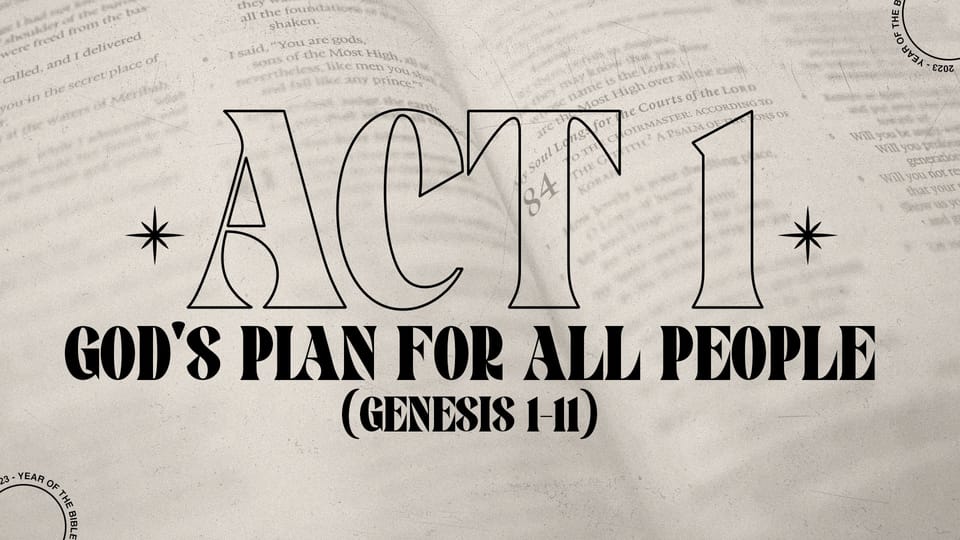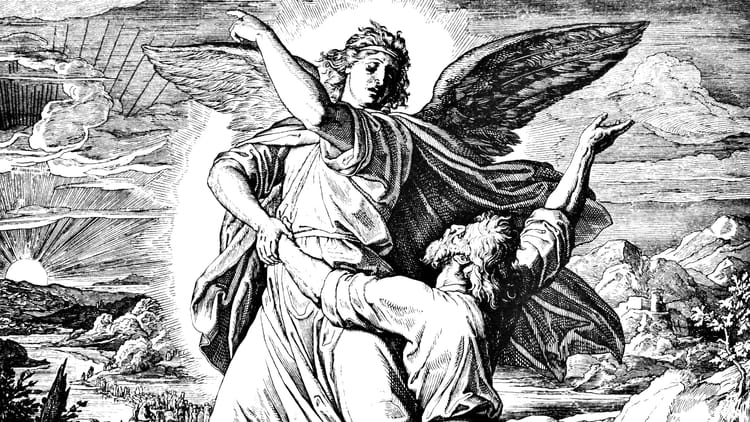God's Plan for All People (Genesis 1-11)

Big Idea: The world was good, but we broke it through sin. But God offers hope that sin and evil won’t have the final word.
Today we begin a big adventure. This year we’re planning on going through the entire Bible from the very first page right to the very end.
Every Sunday we’re going to be covering a fairly large portion of Scripture at a high level. During the week, I encourage you to read George Guthrie’s CSB Day-by-Day Chronological Bible. It should take you about 15 minutes a day.
Our goal this year is not just to read the Bible. It’s to enter the story, the story of the Bible of which we are a part. I want the same thing to happen to us as happened to one reader of the Bible:
The Bible simply got to be bigger inside me than I … I started to see the Bible as the table of contents of my life … God made me to see myself in the context of his love, his design, his authority, his sovereignty, his salvation, and his holiness .. God changed my whole life.
So I invite you to join us this year. What we’re doing over the course of the next year has the potential to change your life. It really is transformational.
The Importance of the Beginning
And out of the whole story, today’s passage is absolutely foundational. What we’re studying today orients us to the rest of the story and to what the world is like. It helps to answer questions like:
- Who is God?
- Who does he relate to the world?
- How did we get here and why?
- What’s wrong with this world?
Today’s part of the story covers thousands of years. Some of the most important concepts about God and this world are revealed in the first part of this story.
This is like the foundation of the story. Get the foundation wrong, and nothing else will matter. Beginnings are important because they set the trajectory for everything else.
If you get this part of the story right, you’re well-equipped to understand the rest of the story. If you don’t get this part of the story right, a lot of other things won’t make sense.
Author Darrell Johnson, drawing inspiration from James Sire and N.T. Wright, says that every worldview is asking and trying to answer the following nine questions:
- What is prime reality? What is the "really real"?
- Who or what are we? What does it mean to be a human being?
- Is there such a thing as "morality," right and wrong? If so, what is its basis; how does one know the good and the bad?
- What is the meaning of history? Or, is there any meaning?
- What is wrong with us? Something is off—what is it?
- Is there a solution; can things be fixed? By whom? How? How quickly?
- Is there a God? If so, can this God be known? And is this God involved in the world, especially relative to human suffering?
- What happens to a human being at death?
- What time is it? "There is an appointed time for everything. And there is a time for every event under heaven" (Eccles 3:1). Where are we in the flow of history?
Genesis 1-11 answers most of these questions. In other words, this part of the story answers some of the deepest questions that humans want to know. It’s hard to overstate the importance of this section of Scripture.
Three Foundational Truths
Here are the three foundational truths this part of the story is designed to teach us.
One: God created us to play an important role in a world marked by order, balance, and harmony.
Genesis 1 and 2 provide the setting and introduce the main characters of the story.
The setting: the earth. God simply speaks and he brings order, balance, and harmony into the world. He doesn’t struggle to create. He simply creates by royal decree. Everything that we see in the world is created by him, and it’s all good.
Everything is made by God: light, water, land, vegetation, fish and birds, animals, and humans. Everything.
Not only that, but we discover that humans were made as the pinnacle of creation and were made for a relationship with God. Genesis 1:26-27 says:
Then God said, “Let us make man in our image, after our likeness. And let them have dominion over the fish of the sea and over the birds of the heavens and over the livestock and over all the earth and over every creeping thing that creeps on the earth.”
So God created man in his own image,
in the image of God he created him;
male and female he created them.
And he gave them a job to do:
And God blessed them. And God said to them, “Be fruitful and multiply and fill the earth and subdue it, and have dominion over the fish of the sea and over the birds of the heavens and over every living thing that moves on the earth.” (Genesis 1:28)
Every human being has royal status. Humans get to represent God in this world as his representatives on earth.
Genesis 1 and 2 tell us a lot. Sometimes we get lost in the details, in trying to understand the intricacies of its message. You could spend a lot of time here because it lays the foundation for so many issues we face today.
What should we think about gender and sexuality? This passage lays the groundwork for answering this question.
Does the Bible value women? Right on page 1, the Bible answers this question in no uncertain terms. Both men and women are created in the image of God.
What should we think about medical assistance in dying (MAID)? As the Evangelical Fellowship of Canada states:
All human life is precious. Life is a gift from God for us to respect and protect through all its stages. Each person’s life has worth, regardless of their age or ability, because they are made in the image of God and loved by him. This belief in the sanctity of all human life compels us to completely oppose euthanasia and assisted suicide.
What pattern should shape our lives? A seven-day week, with one day a week devoted to rest.
What is our purpose as humans? To live in a relationship with God and represent him in this world.
Here, though, is the core message of what it tells us: God created us to play an important role in a world marked by order, balance, and harmony. “The world was the product of a deliberate plan and purpose of one transcendent God” (What the Old Testament Authors Really Cared About).
Genesis 1 and 2 gives us a picture of God’s plan for humanity: “God’s people dwelling in God’s place with full access to his presence” (The Epic of Eden).
That’s the primary message of Genesis 1 and 2, and it lays the foundation for everything else. You were made for the world of Genesis 1 and 2. You were made for a world of order, balance, and harmony. You were made to live in God’s place with full access to his presence. You were made with dignity and honor.
Here’s the second foundational truth.
Two: We revolted against God, and the world became marked by disorder, imbalance, and disunity.
From Genesis 3 to 11 you get a number of different rebellions against God.
In Genesis 3, you have the rebellion of Adam and Eve. They faced the question of whether or not to obey God. In a desire for moral independence, they made a catastrophic choice. They struck a match and set the world on fire. It affected everything. It brought emotional, spiritual, relational, environmental, and physical death. “in an instant, God’s perfect world becomes ʾĀdām’s broken world” (The Epic of Eden). We were meant to rule the world of order, balance, and harmony on God’s behalf. Instead, we brought the world into disorder, imbalance, and disunity, and once we sinned, we were powerless to fix it.
But that’s not the only rebellion you see in Genesis 3-11:
- In Genesis 4, Cain kills his brother Abel, which is just the beginning. Violence marks humanity. Sin begins to dominate everything.
- In Genesis 6, things get so bad that God decides to start again by flooding the world. It’s a sober reminder of God’s judgment over sin. God undoes the six days of creation in a flood, leaving only one family to repopulate the earth. But at the end of chapter 9, this new family has rebelled again. Noah is drunk, and a scandal rocks his family. God remakes the world, but sin still persists.
- Then, in Genesis 11, people try to band together and build a tower that reaches into heaven without God. Again, they’re trying to overcome their limits. Catch the irony: They say, “Come, let us build ourselves a city and a tower with its top in the heavens,” and the next verse says, “And the LORD came down to see the city and the tower, which the children of man had built” (Genesis 11:4-5).
It’s bad. It’s a pretty bleak picture, but it explains so much of life. You get a picture of the ugliness and devastation of sin, and the sense of dislocation and longing that we all feel. Romans 8 puts it so well:
For we know that the whole creation has been groaning together in the pains of childbirth until now. And not only the creation, but we ourselves, who have the firstfruits of the Spirit, groan inwardly as we wait eagerly for adoption as sons, the redemption of our bodies. (Romans 8:22-23)
We sense that the world’s not right. We know inside that things are supposed to be better than they are. No matter how good things get we know that something is profoundly wrong with this world and with us. Genesis 3 to 11 explains why. We rebelled against God, and the world became marked by disorder, imbalance, and disunity. We brought global wickedness and death into the world.
But there’s one more foundational truth.
Still, there’s a glimmer of hope.
Look carefully, and you see little signs of hope everywhere.
In Genesis 3:15, God says that the serpent, who tempted Eve, will one day be bruised by the offspring of Adam and Eve. Evil has ruined the world, but God offers hope. Its days are numbered.
And then God clothes Adam and Eve. “And the LORD God made for Adam and for his wife garments of skins and clothed them” (Genesis 3:21). What an act of care and kindness to people who’d just committed cosmic treason.
And then you have these genealogies. God allows humanity to continue, and with it the promise continues that one day the seed of Eve will one day crush the serpent’s head.
And then Noah passes through God’s judgment against sin. There’s hope that some may be able to survive God’s judgment. You get this phrase, even in the middle of the judgment of the flood. “But God remembered Noah and all the beasts and all the livestock that were with him in the ark” (8:1). God makes a covenant with Noah that he will never again flood the earth. He says, “I will remember my covenant that is between me and you and every living creature of all flesh” (9:15). “In the midst of wrath, God remembers mercy” (Mark Dever).
Feel the tension. The world was made good but it’s been decimated by sin. We deserve God’s judgment but you get these glimmers of hope that God isn’t done with us yet.
That’s the start of the story. It explains so much about you — that you were made with dignity, that you were made for a relationship with God, that you were made to live in a world of order, balance, and harmony. It explains our greatest problem: that sin has destroyed everything that was good and has brought disorder, imbalance, and disunity into the world. But it points us to a hope: that God is merciful, that he clothes sinners, that he remembers his promises, and that he will one day defeat evil.
That’s the beginning of the story.
Let me put it this way: What did the first Adam lose? Because that is going to set us up to discover what the second Adam — Jesus — buys back.
The world was good, but we broke it through sin. But God offers hope that sin and evil won’t have the final word.
That’s as far as you get in Genesis 1-11. But the stage is set, and we’re right on the verge of the beginning of God’s rescue plan that launches in Genesis 12, a plan that leads us right to Jesus.
Here’s the hope:
The history of man’s relationship to his heavenly Father is not one of his chasing after God. No, the accounts in the Bible, the stories of history, and the reality of today are filled with the miracle of God pursuing His creatures as they flee. God stoops to clothe our nakedness. He soothes our embarrassments and pain. He covers our guilt and restores us to our position as His image-bearers and vice-regents. God takes the first step. (What’s in the Bible)
God takes the initiative in fixing our biggest problem. God pursues us with his mercy. God takes the first step in dealing with our sin.
Father, thank you for making so much clear in Act 1. Thank you for revealing who you are, how you created this world, and what’s gone wrong. And thank you for pursuing us with your mercy, of taking the first step in dealing with our sin.
Our sin is not the final word. Thank you for Jesus who came later in the story to deal decisively with our sin. As you pursue us, may we turn to you and trust that second Adam who will make this world right. In Jesus’ name. Amen.





